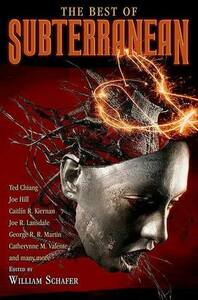Take a photo of a barcode or cover
My favorite of Chiang's works so far. What starts out as an essay against a cloud-based personal search engine for personal memories, contrasted with a telling of a tribe coming to terms with the technology of writing, becomes a personal account of how our personal narratives can become self-justifying and biased.
While not as speculative or far-reaching as his other work, this piece has a grace and humanism that carries it above the other works of his that I've read. It is full of mimi, going where mere vough can't.
While not as speculative or far-reaching as his other work, this piece has a grace and humanism that carries it above the other works of his that I've read. It is full of mimi, going where mere vough can't.
Read for the 2014 Hugos.
I though this was an interesting story, written almost in an essay format. It manages to tie together two storylines, making a point about cultures changing over time. It also had a very good surprise in store.
I though this was an interesting story, written almost in an essay format. It manages to tie together two storylines, making a point about cultures changing over time. It also had a very good surprise in store.
Mixed bag like many anthologies. Some really good stories, some only all right. The enh ones tended to outweigh the really great ones for me, so 3.5 stars.
Excellent slice of sci-fi. I thought of Stiegler's The Gentle Seduction and oh yes, Marshall McLuhan.
Wow. It didn't go where I was expecting it too. A great, thought provoking story.
I wish I could give more stars! I read this because a friend in a Dystopian book club said this was the short story the episode The Entire History of You of Black Mirror was based on. tEHoY is not one of my favorite episodes, but that's not a bad thing since the worst episode in that series is better than many series best offerings.
This longish short story was terrific! It made me think even more than the episode did about how we all rewrite our own history and we are almost always the hero of our that story. Even when we act much less than heroic.
I will now be looking for everything Ted Chiang ever wrote because he has apparently won many awards and this is nowhere near his best. Wow! Just wow.
This longish short story was terrific! It made me think even more than the episode did about how we all rewrite our own history and we are almost always the hero of our that story. Even when we act much less than heroic.
I will now be looking for everything Ted Chiang ever wrote because he has apparently won many awards and this is nowhere near his best. Wow! Just wow.
Quick, compelling read about the dangers of immersive technology that records everything we do. Very similar to the Black Mirror episode, "The Entire History of You," except the main character in this story is far more sympathetic. Though I almost preferred the parallel story of written language being introduced to a rural village.
A man explores memory and truth. Writing comes to the Tiv people.
This is part story, part philosophical exploration of memory and truth. The story is actually story here, though, rising above things like the Platonic dialogues because the characters are actually fleshed out and travel an arc, not simply straw men. Above that, the story enacted by the narrator and the story of the Tiv people, even this overall story by Ted Chiang, illustrate the Truth of Feeling better than a mere argument could. The journey of the narrator and of Jijingi as they develop and explore the topics give me plenty of food for thought and self-examination.
NOTE: I read this as part of the 2014 Hugo Voter Pack.
This is part story, part philosophical exploration of memory and truth. The story is actually story here, though, rising above things like the Platonic dialogues because the characters are actually fleshed out and travel an arc, not simply straw men. Above that, the story enacted by the narrator and the story of the Tiv people, even this overall story by Ted Chiang, illustrate the Truth of Feeling better than a mere argument could. The journey of the narrator and of Jijingi as they develop and explore the topics give me plenty of food for thought and self-examination.
NOTE: I read this as part of the 2014 Hugo Voter Pack.



